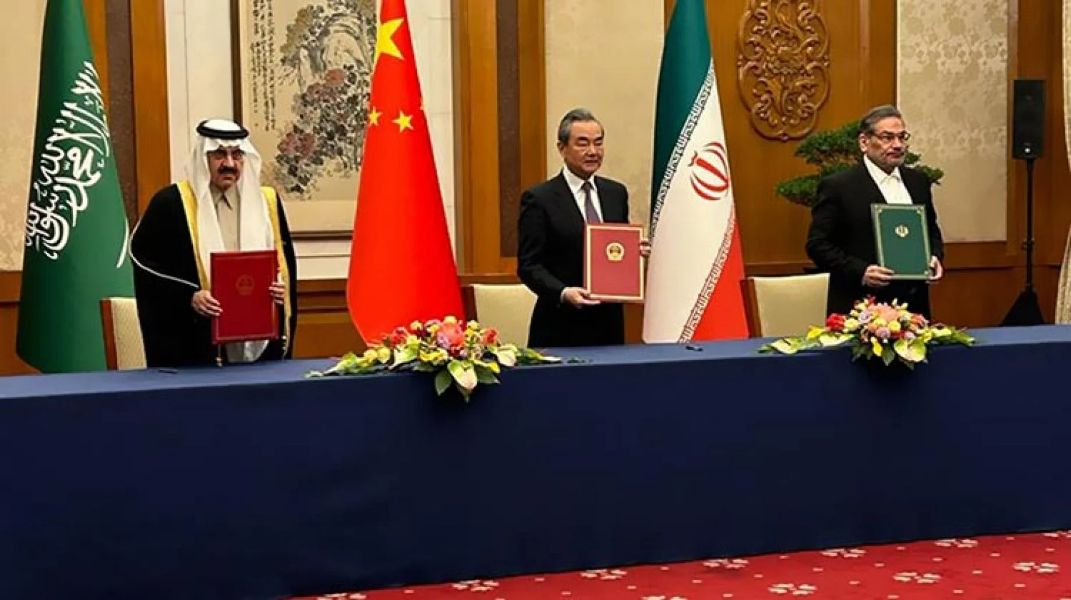
-
Published: 11 March 2023

In a game-changing moment in the Middle East that ended an era of decades-long rivalry and also emphasized China's growing influence in the oil-rich region, both Saudi Arabia and Iran buried the hatchet in Beijing on Friday, when the two regional powers in the Middle East mediated by China held talks to restore diplomatic relations.
Edited by| Tony Wild
Politic section - CJ journalist
Middle East – 11 march 2023
Iran’s talks with Saudi Arabia were unfolding at the same time as negotiations between Iran and the United States to revive the 2016 nuclear deal were faltering. The outcomes of both sets of Iran talks seemed interlinked – Riyadh and Washington have long walked in lockstep on foreign policy.
But a shift in regional alliances is afoot. Saudi Arabia’s relationship with the US has become strained in recent years, while China’s standing has risen. Unlike Washington, Beijing has shown an ability to transcend the many rivalries that crisscross the Middle East. China has forged good diplomatic relations with countries across the region, driven by strengthening economic ties, without the Western lectures on human rights.
In retrospect, Beijing has been poised to broker the conflict-ridden Middle East’s latest diplomatic breakthrough for years, simultaneously underscoring the US’ diminishing regional influence.
“While many in Washington will view China’s emerging role as mediator in the Middle East as a threat, the reality is that a more stable Middle East where the Iranians and Saudis aren’t at each other’s throats also benefits the United States,”
Friday’s agreement could herald the end of a blood-drenched era in the Middle East. Riyadh and Tehran have been at ideological and military loggerheads since Iran’s Islamic Revolution installed an anti-Western, Shia theocracy in 1979.
Those tensions began to escalate into a region-wide proxy war after the 2003 US invasion of Iraq spiraled into civil conflict, with both Iran and Saudi Arabia vying for influence in the petrol-rich Arab country.
The armed conflict that pitted Saudi-backed militants against Iran-backed armed groups washed over much of the region in the decade and a half that followed.
In Yemen, a Saudi-led coalition military campaign to quash Iranian-backed rebels triggered one of the world’s worst humanitarian crises. In Syria, Iran supported President Bashar al-Assad as he brutalized his own people, only to find his forces facing off with rebels backed by Saudi Arabia and other Gulf countries. In Lebanon too, Iran and Saudi Arabia have backed different factions, contributing to a two-decade-long political crisis that has exacted a huge economic and security toll on the tiny eastern Mediterranean country.
Diplomatic relations were officially severed in 2016 when Saudi Arabia executed prominent Shia Saudi cleric Nimr al-Nimr, leading rioters in Tehran to torch the Saudi embassy.
But a slew of economic problems triggered by the pandemic and costly wars may have eroded the appetite for conflict, and Saudi and Iranian officials say they are eager to turn the page on that dark chapter.
The détente appears to go far beyond the resumption of diplomatic relations. Saudi and Iranian officials say they will also work to reimplement a decades-old security cooperation pact and revive an even older agreement on technology, and trade.
But analysts say that China’s growing leverage in the region helped hedge both countries’ bets, changing a now-outdated political calculus that once made Western capitals the most likely venue for watershed regional accords.
“If Iran were to break this agreement, it will be hurting its ties to China which have put its full prestige into the ‘tripartite’ agreement.”
